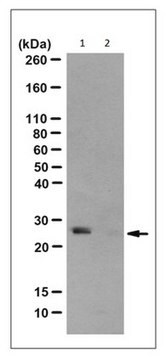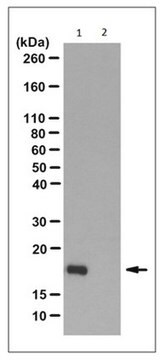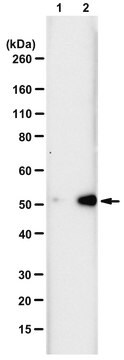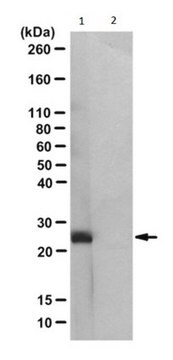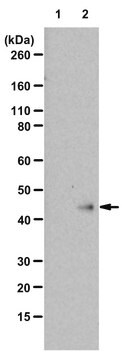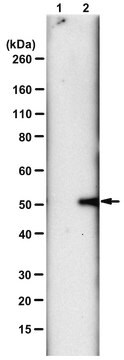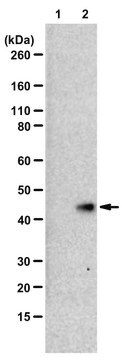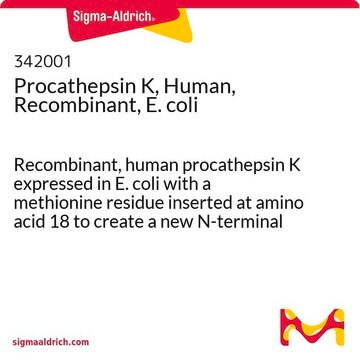MABS1330
Anti-N1-Phosphohistidine (1-pHis) Antibody, clone SC1-1
clone SC1-1, from rabbit
別名:
N1-Phosphohistidine
ログイン組織・契約価格を表示する
すべての画像(1)
About This Item
UNSPSCコード:
12352203
eCl@ss:
32160702
NACRES:
NA.41
クローン:
SC1-1, monoclonal
application:
DB
ICC
WB
affinity chromatography
ICC
WB
affinity chromatography
化学種の反応性:
E. coli, human
テクニック:
affinity chromatography: suitable
dot blot: suitable
immunocytochemistry: suitable
western blot: suitable
dot blot: suitable
immunocytochemistry: suitable
western blot: suitable
citations:
7
おすすめの製品
由来生物
rabbit
品質水準
抗体製品の状態
purified antibody
抗体製品タイプ
primary antibodies
クローン
SC1-1, monoclonal
化学種の反応性
E. coli, human
化学種の反応性(ホモロジーによる予測)
all
テクニック
affinity chromatography: suitable
dot blot: suitable
immunocytochemistry: suitable
western blot: suitable
アイソタイプ
IgG
輸送温度
wet ice
ターゲットの翻訳後修飾
phosphorylation (N1-pHis)
詳細
Phosphorylation plays an important role in regulating protein activities and various cellular signaling events in cells. Limited by the tools available for phosphohistidine (pHis) detection, the majority of studies focus on serine, threonine, and tyrosine phosphorylations. Histidine phosphorylation can occur at either N1 (1-pHis) or N3 (3-pHis) of the imidazole ring. The development of peptides containing stable phosphoryltriazolylalanine analogues of 1-pHis and 3-pHis (1-pTza and 3-pTza) allows the generation of antibodies for studying both histidine N1 and N3 phosphorylations in signaling events. There is growing evidence implicating His kinases in cancer and tumor metastasis and the first metastasis suppressor gene identified is one of the two known mammalian His kinases, Nm23-H1 (also known as NME1, nucleoside diphosphate kinase, or NDPK-A). Nm23-H1/NME1 and the closely related Nm23-H2 (NME2/NDPK-B) catalyze the transfer of phosphate from ATP onto Nucleoside-diphosphates (NDPs) through a 1-pHis enzyme intermediate. Nm23-H1/-H2 also possess His kinase activity, transferring the phosphate from the active site pHis onto a His in a target protein. Metabolic enzymes such as phosphoglycerate mutase (PGAM), succinyl CoA synthase (SCS), and ATP citrate lyase (ACL) also use pHis as an enzyme intermediate. Unlike NME1/2, PGAM uses 3-pHis as an enzyme intermediate. In addition to eukaryotes, histidine phosphorylation is well documented in bacterial “two-component” signaling pathways involved in chemotaxis, although the phosphate is transferred from the pHis formed in the receptor/sensor protein to Asp residues of an acceptor response regulator protein, and the receptor/sensor protein essentially functions as an aspartate kinase.
特異性
Selectively detects proteins with histidine(s) phosphorylated at N1 of the imidazole ring (1-pHis), but not 3-pHis.
Target modification is not species specific.
免疫原
Epitope: N1-phosphohistidine (1-pHis)
KLH-conjugated library of random peptides containing non-hydrolyzable phosphohistidine analogue 1-pTza.
アプリケーション
Anti-N1-Phosphohistidine (1-pHis) antibody, clone SC1-1 is an isomer-specific monoclonal Ab to specifically detect histidine phosphorylated at position N1. This purified mAb is backed by published data demonstrating performance in Western Blots, immunofluorescence & immunoaffinity purification.
Dot Blot Analysis: A representative lot detected recombinant human NM23-H1/NME1 in vitro autophosphorylation on His118, as well as peptides containing 1-pTza, but not 3-pTza phosphohistidine analogue. Clone SC1-1 is most reactive toward 1-pTza peptides based on NM23-H1/NME1 1-pHis118 sequence, less reactive toward those based on histone H4 1-pHis18 or ACLY 1-pHis760 sequence, least reactive toward GNB1 1-pHis266-based or Kca3.1 1-pHis358-based sequence and not reactive toward phosphorylated tyrosine (Fuhs, S.R., et al. (2015). Cell. 162(1):198-210).
Western Blotting Analysis: A representative lot detected heat-sensitive histidine N1-phosphorylation (1-pHis) in multiple cell lysates (Fuhs, S.R., et al. (2015). Cell. 162(1):198-210).
Immunocytochemistry Analysis: A representative lot detected N1-phosphohistidine (1-pHis) immunoreactivity distinct from that of 3-pHis in 4% paraformaldehyde-fixed HeLa cells and murine bone marrow-derived macrophages by fluorescent immunocytochemistry. The 1-pHis immunoreactivity was found in regions surrounding acidic compartments, but not inside these compartments or nuclei (Fuhs, S.R., et al. (2015). Cell. 162(1):198-210).
Immunoaffinity Purification: A representative lot was cross-linked to protein A resins for immunoaffinity purification of 1-pHis proteins from cell lysates prior to LC-MS/MS analysis (Fuhs, S.R., et al. (2015). Cell. 162(1):198-210).
Note: DO NOT HEAT SAMPLES prior to phosphohistidine detection. Histidine phosphorylation is heat and acid labile. To generate negative control for specificity test, an aliquot of sample can be heated at 95ºC for 10-15 minutes to reverse histidine phosphorylation. Alternatively, an aliquot of sample can be incubated under acidified pH at 37ºC for 15 minutes to reduce histidine phosphorylation. Acidify each 100 µL sample with 25 µL of 1 M HCl before the incubation, then neutralize with 25 µL of 1 M NaOH prior to phosphohistidine detection.
Western Blotting Analysis: A representative lot detected heat-sensitive histidine N1-phosphorylation (1-pHis) in multiple cell lysates (Fuhs, S.R., et al. (2015). Cell. 162(1):198-210).
Immunocytochemistry Analysis: A representative lot detected N1-phosphohistidine (1-pHis) immunoreactivity distinct from that of 3-pHis in 4% paraformaldehyde-fixed HeLa cells and murine bone marrow-derived macrophages by fluorescent immunocytochemistry. The 1-pHis immunoreactivity was found in regions surrounding acidic compartments, but not inside these compartments or nuclei (Fuhs, S.R., et al. (2015). Cell. 162(1):198-210).
Immunoaffinity Purification: A representative lot was cross-linked to protein A resins for immunoaffinity purification of 1-pHis proteins from cell lysates prior to LC-MS/MS analysis (Fuhs, S.R., et al. (2015). Cell. 162(1):198-210).
Note: DO NOT HEAT SAMPLES prior to phosphohistidine detection. Histidine phosphorylation is heat and acid labile. To generate negative control for specificity test, an aliquot of sample can be heated at 95ºC for 10-15 minutes to reverse histidine phosphorylation. Alternatively, an aliquot of sample can be incubated under acidified pH at 37ºC for 15 minutes to reduce histidine phosphorylation. Acidify each 100 µL sample with 25 µL of 1 M HCl before the incubation, then neutralize with 25 µL of 1 M NaOH prior to phosphohistidine detection.
品質
Evaluated by Western Blotting of NME1 autophosphorylation reaction.
Western Blotting Analysis: 0.3 µg/mL of this antibody detected recombinant human NME1 (NM23-H1) with N1-phosphohistidine (1-pHis) in a 5 µg aliquot of autophosphorylation reaction.
Western Blotting Analysis: 0.3 µg/mL of this antibody detected recombinant human NME1 (NM23-H1) with N1-phosphohistidine (1-pHis) in a 5 µg aliquot of autophosphorylation reaction.
ターゲットの説明
Variable depending on the histidine-phosphorylated proteins.
物理的形状
Format: Purified
その他情報
Concentration: Please refer to lot specific datasheet.
適切な製品が見つかりませんか。
製品選択ツール.をお試しください
保管分類コード
12 - Non Combustible Liquids
WGK
WGK 1
引火点(°F)
Not applicable
引火点(℃)
Not applicable
適用法令
試験研究用途を考慮した関連法令を主に挙げております。化学物質以外については、一部の情報のみ提供しています。 製品を安全かつ合法的に使用することは、使用者の義務です。最新情報により修正される場合があります。WEBの反映には時間を要することがあるため、適宜SDSをご参照ください。
Jan Code
MABS1330:
試験成績書(COA)
製品のロット番号・バッチ番号を入力して、試験成績書(COA) を検索できます。ロット番号・バッチ番号は、製品ラベルに「Lot」または「Batch」に続いて記載されています。
LHPP suppresses gastric cancer progression via the PI3K/AKT/mTOR signaling pathway.
Wang, et al.
Journal of Cancer, 13, 3584-3592 (2022)
Kevin Adam et al.
Methods in molecular biology (Clifton, N.J.), 2077, 209-224 (2019-11-11)
Immunofluorescence (IF) takes advantage of biological and physical mechanisms to identify proteins in cell or tissue samples, exploiting the specificity of antibodies and stimulated fluorescence light emission. Here, we describe an immunofluorescence staining method for the identification of histidine phosphorylated
He Zhao et al.
Nature communications, 11(1), 518-518 (2020-01-26)
Ethylene plays essential roles during adaptive responses to water-saturating environments in rice, but knowledge of its signaling mechanism remains limited. Here, through an analysis of a rice ethylene-response mutant mhz1, we show that MHZ1 positively modulates root ethylene responses. MHZ1
Rajasree Kalagiri et al.
Methods in molecular biology (Clifton, N.J.), 2077, 181-191 (2019-11-11)
Immunoblotting is a ubiquitous immunological technique that aids in detecting and quantifying proteins (including those of lower abundance) and their posttranslational modifications such as phosphorylation, acetylation, ubiquitylation, and sumoylation. The technique involves electrophoretically separating proteins on an SDS-PAGE gel, transferring
Imran Khan et al.
Oncotarget, 9(12), 10185-10202 (2018-03-15)
The NM23/NME gene was identified as a metastasis suppressor. It's re-expression inhibited cancer cell motility and suppressed metastasis, without effecting primary tumor size in multiple model systems. The mechanisms of NME suppression of motility and metastasis are incompletely known. Of
ライフサイエンス、有機合成、材料科学、クロマトグラフィー、分析など、あらゆる分野の研究に経験のあるメンバーがおります。.
製品に関するお問い合わせはこちら(テクニカルサービス)